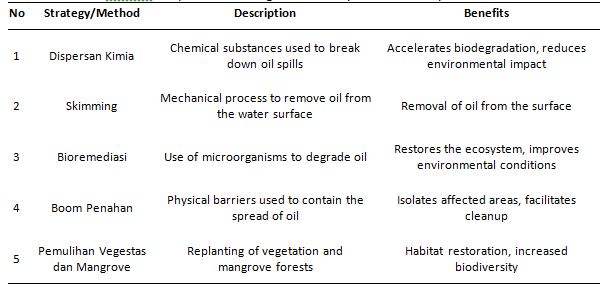Mitigating the Impact of Oil Spills in the Sea with Responsive Strategies and Ecosystem Recovery
Main Article Content
Abstract
Oil spills in the marine environment pose a significant threat to ecosystems, wildlife, and human livelihoods. The consequences of oil spills can be devastating, ranging from immediate wildlife fatalities to long-term ecological damage and disruption of coastal economies. This study provides a comprehensive review of the current strategies and technologies employed to mitigate the impact of oil spills in the marine environment. The research approach includes a thorough literature review, expert interviews, case studies, and quantitative analysis. The findings highlight the advancements in oil spill detection and monitoring techniques, leveraging remote sensing, autonomous vehicles, and advanced modeling. The study also examines the evolution of oil spill containment and cleanup methods, including mechanical recovery, chemical dispersants, and in-situ burning, underscoring the need for a balanced and contextual application of these techniques. The research emphasizes the importance of bioremediation and ecological restoration strategies in addressing the long-term impacts of oil spills on marine ecosystems. Additionally, the study explores the role of regulatory frameworks and international cooperation in enhancing oil spill preparedness and response, as well as the critical importance of stakeholder engagement and community resilience in mitigating the impact of these events. The study concludes that addressing the challenges associated with oil spills in the marine environment requires a holistic approach that integrates technological advancements, regulatory frameworks, international cooperation, and community engagement. By leveraging the insights and recommendations from this research, policymakers, environmental managers, and industry stakeholders can work collaboratively to develop and implement more effective strategies for safeguarding marine ecosystems and coastal communities.
Downloads
Article Details

This work is licensed under a Creative Commons Attribution 4.0 International License.
Accepted 2024-06-28
Published 2024-06-28
References
International Maritime Organization (IMO), "International Convention for the Prevention of Pollution from Ships (MARPOL)," 1973/1978.
National Oceanic and Atmospheric Administration (NOAA), "Deepwater Horizon Oil Spill: Long-term Effects on the Gulf of Mexico," 2020.
J. Adler and R. Woolsey, "Oil Spill Monitoring and Response Using Autonomous Underwater Vehicles," Journal of Ocean Technology, vol. 12, no. 3, pp. 25-35, 2017.
S. Nayak and K. Mishra, "Bioremediation of Oil Spills in the Marine Environment: A Review," Environmental Science and Pollution Research, vol. 26, no. 8, pp. 7319-7332, 2019.
M. Fingas, "Oil Spill Science and Technology," Gulf Professional Publishing, 2011.
N. Muammar dan A. Mosyofa, “KEBIJAKAN MARITIM INDONESIA DALAM MENUNJANG SISTEM KEAMANAN TRANSPORTASI LAUT”, SENSISTEK, vol. 7, no. 1, hlm. 46-50, Mei 2024.

